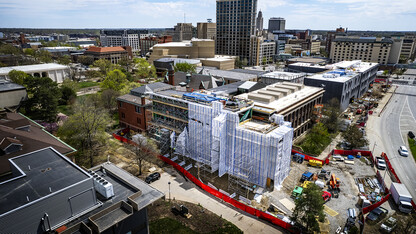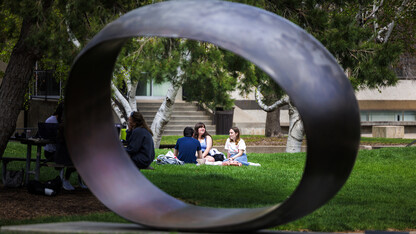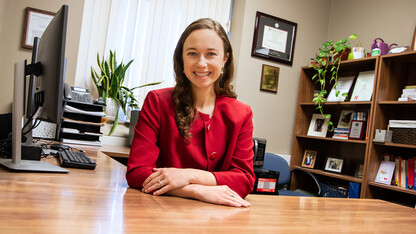· 5 min read
After 43 years, Dunn readies for final UNL show

A career that has sent thousands on explorations into the cosmos — and on the occasional soiree to Pink Floyd’s “Dark Side of the Moon” — is drawing to a close.
After 43 years at the helm of Mueller Planetarium, Jack Dunn is retiring and will follow his wife, Elizabeth Klimek, as she becomes director of a new planetarium in South Carolina. Dunn’s last day at UNL is Aug. 7.
“The variety of this job has kept me coming back each day,” Dunn said. “I’ve made great friendships and worked with some really interesting characters. But, I’m not one who worships the past. I’ve done my bit and it is time for others to step up and keep this planetarium going.”
A Fremont native and Midland Lutheran graduate, Dunn was in Louisiana and had been running a planetarium for two years when he accepted the UNL gig in 1971. When he walked in the door, Mueller Planetarium boasted a single car speaker sound system and two slide projectors wrapped in insulation inside giant wooden boxes.
“Other than the obvious fire hazard of those slide projectors, I decided there was enough to work with,” Dunn said. “It was a start.”
The early shows followed the standard planetarium model at the time — a record player scratching out music for lights down, star projector turned on, a talk about the current night sky, maybe spend a few minutes on an astronomical topic, and back to the record player for lights up. He soon flipped that system around, writing scripts that explored space topics in depth and incorporating a short talk on the current sky at the end. He also pursued technological advances in the industry whenever possible, integrating recorded soundtracks that played throughout a show and adding audiovisual elements.
“I’ve always been interested in trying new things,” Dunn said. “I felt it was important to maintain industry contacts, watch for new technology to deliver shows, and figure out how to incorporate those ideas here.”
Dunn brought the first laser light show to Mueller Planetarium in 1977. The show, ran by Larry Goodridge, who was an instructor at the art academy in Cincinnati, Ohio, featured an eclectic mix of music and was an immediate hit.
“The director of the museum at the time told me he didn’t think anyone would come, but all of those first shows sold out,” Dunn said. “They even played a Pink Floyd song. It wasn’t ‘Dark Side of the Moon,’ but it was there.”
By the mid-1980s, Dunn and engineering student Walt Simmons cobbled together the planetarium’s first laser and started producing custom shows.
“At one time, we were producing new laser shows every week,” Dunn said. “It was a lot of fun, but it also meant I spent a lot of nights here in the museum finishing up shows.”
During much of that time, Dunn created shows with his son Mike.
“Mike grew up working on laser shows,” Dunn said. “Today, he works for a company called Lightwave and does major laser events for things like concert tours, Las Vegas and theme parks.”
Dunn’s favorite laser show memories include the packed house the first time the planetarium played the “Dark Side of the Moon” show, hosting the International Laser Display Association conference twice, and helping Athletics celebrate the Husker football national championship in 1995.
“I’ll never forget running a laser light show for 45,000 people in Memorial Stadium,” Dunn said. “That was loads of fun.”
When the laser system failed in the early 2000s and repairs were simply too expensive, Dunn went back to using industry contacts to bring occasional laser shows to UNL.
In 2006, Dunn enhanced the planetarium offerings by installing a unique fulldome system, which uses specialized mirrors to project shows across the planetarium’s 30-foot-wide dome. At the time of the upgrade, Mueller Planetarium was the only facility between Chicago and Denver with such a system.
When he wasn’t working in the planetarium, Dunn has been active in the local and national astronomy community. He is president of the Prairie Astronomy Club of Lincoln and the Great Plains Planetarium Association, a member of the governing council of the International Planetarium Society, chair of the Hyde Memorial Observatory’s board of supervisors, and member of the Nebraska Star Party’s board of directors.
The International Laser Display Association helped promote Dunn’s work with laser projections for the visually impaired. Dunn has consulted with NASA, Jet Propulsion Lab and planetariums around the world to develop new interstellar shows. And the list of distinguished speakers he has brought to campus includes several astronauts and distinguished engineers.
In retirement, Dunn plans to volunteer at his wife’s planetarium at the South Carolina State Museum. He also will continue to consult in the industry.
“I’ve enjoyed most of my time here at UNL,” Dunn said. “My favorite part has been encouraging people to explore and learn as much as they can.”
A search will be conducted to replace Dunn. Planetarium shows will continue to be featured at the museum in the interim.







